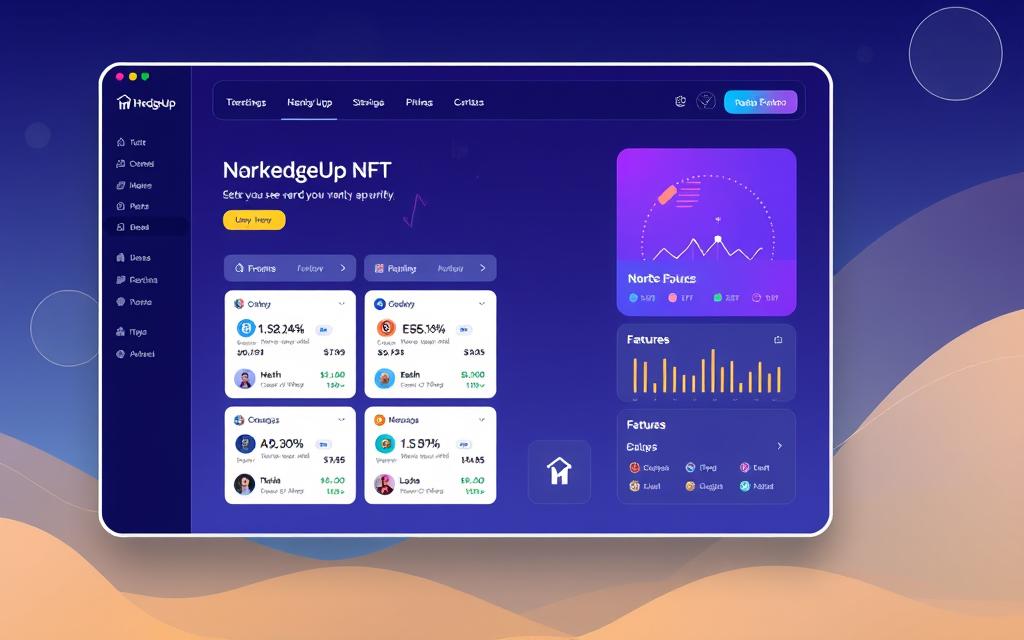The rise of Web3 projects has led to an influx of new investment opportunities, but it has also raised concerns about crypto scams. HedgeUp presents itself as a platform that allows users to buy and sell alternative assets through NFTs, but its transparency has been questioned.
Online reviews have highlighted several red flags, including hidden ownership information on its website, app.hedgeup.io. A comprehensive review of the platform’s business model and promised returns is necessary to determine its legitimacy.
This analysis will examine the utility of its HDUP token and compare its practices to established crypto projects, providing a balanced evaluation for potential investors.
What is HedgeUp? Understanding the Platform

HedgeUp is revolutionising the way we invest in alternative assets through its innovative Web3 platform. As an upcoming project, HedgeUp is building an investment platform that allows users to buy and sell alternative assets through NFTs.
HedgeUp’s Business Model and Promises
HedgeUp’s business model centres around simplifying investment in alternative assets by eliminating traditional paperwork and costs. The platform claims to democratise access to luxury investments through fractional ownership, allowing investors to purchase portions of high-value assets like gold, luxury watches, and diamonds.
The platform’s value proposition lies in its ability to make alternative asset investments more accessible and affordable. By tokenising these assets through NFTs, HedgeUp is creating a new market for investors.
The HDUP Token and Its Claimed Utility
The HDUP token serves as the ecosystem’s currency for purchasing assets, bidding at auctions, and paying trading fees on the platform. Currently in presale stage two at $0.013, the token has reportedly sold over 73 million tokens with approximately 18.6 million remaining.
Some analysts predict that the token will 30x in value during the next bull run, making it a potentially lucrative investment opportunity for investors. However, it is essential to examine whether these promises align with the actual implementation and transparency of the project.
Is HedgeUp Legit? Analysing the Red Flags
Investigating HedgeUp’s legitimacy reveals several red flags that warrant caution. The platform’s authenticity is under scrutiny due to various concerning factors related to its website privacy and security.
Transparency Issues and Hidden Ownership
A significant concern is the deliberate concealment of ownership information. The WHOIS data shows “REDACTED FOR PRIVACY” across all contact fields, raising questions about accountability and trust in the project. HedgeUp uses Whois Privacy Corp to mask the identities of the team, further complicating the verification process.
Website Security and Technical Concerns
Technical analysis reveals concerning patterns: the site is hosted within another website and redirects users without consent, a common tactic in phishing operations. The domain registrar used by HedgeUp has a documented history of hosting fraudulent websites, negatively impacting the site’s trust score. While the site has an SSL certificate, it’s only a basic Domain Validated Certificate, indicating a need for more rigorous security measures.
User Reviews and Community Feedback
User reviews are overwhelmingly negative, with an average score of just 1 star based on limited feedback. Independent reviewers have given HedgeUp a transparency score of 2/10, citing a “lack of transparency surrounding its operations, limited information about its team, and absence of a well-defined investment strategy.” These factors create a concerning privacy and security profile that would typically prompt caution from experienced investors conducting due diligence research and reviewing the report.
| Red Flags | Description | Impact |
|---|---|---|
| Hidden Ownership | Concealment of ownership information | Questions accountability and trust |
| Technical Issues | Hosting within another website and redirects without consent | Common phishing tactics, negatively impacts trust score |
| Negative Reviews | Average score of 1 star and low transparency score | Indicates lack of transparency and poor security profile |
HedgeUp’s Investment Claims: Fact vs Fiction

A critical analysis of HedgeUp’s investment promises reveals several concerns. HedgeUp claims to be a pioneering platform in the Web3 space, promising significant improvements to the alternative assets market. However, the legitimacy of these claims is questionable.
The Alternative Assets Investment Model
HedgeUp’s central investment claim revolves around democratising access to alternative assets like luxury watches and gold through tokenisation. The proposed model would require substantial infrastructure, partnerships, and legal frameworks. However, there is a lack of transparency surrounding these aspects, raising concerns about the project’s viability.
Realistic Expectations vs Promised Returns
The promised 30x return on investment during the next bull run appears speculative and lacks substantiation beyond promotional content. Realistic investment expectations would require detailed information about the team’s expertise in both alternative assets and blockchain technology. Without clear documentation about custody arrangements for physical assets, investors face significant uncertainty about the security of their investments.
The project’s promotional materials focus heavily on potential returns while providing minimal information about risk factors that could affect token holders. Investors should approach HedgeUp’s investment claims with caution and conduct thorough research before making any decisions.
Comparing HedgeUp to Legitimate Crypto Projects
When evaluating cryptocurrency projects, transparency is crucial for establishing trust among potential investors. Legitimate crypto projects are characterised by their openness and clarity in operations, team composition, and investment strategies.
Transparency Standards in Reputable Crypto Projects
Reputable crypto projects maintain transparent team profiles with verifiable credentials and professional backgrounds. In contrast, HedgeUp conceals its team identities through privacy services, deviating from industry best practices. Established blockchain projects provide comprehensive documentation, including detailed whitepapers and regular development updates on their website.
Team Visibility and Expertise
Legitimate crypto projects typically have publicly known founders and key team members with verifiable expertise. HedgeUp’s lack of transparency regarding its team raises concerns about its legitimacy and operational credibility. A transparent team profile is essential for building trust with potential investors.

Investment Strategy Clarity
Reputable crypto projects offer clear investment strategies, including detailed tokenomics and transparent reporting on project milestones. HedgeUp falls short in providing such clarity, making it challenging for investors to assess its viability. The absence of a clear investment strategy is a significant red flag for potential investors.
In conclusion, when comparing HedgeUp to legitimate crypto projects, significant differences in transparency, team visibility, and investment strategy clarity become apparent. These factors are crucial for investors to consider when evaluating the legitimacy and potential of a cryptocurrency project.
Conclusion: Should You Trust HedgeUp?
After a thorough examination, concerns regarding HedgeUp’s transparency and operational integrity come to the fore. The platform’s significant transparency issues, with a score of just 2/10, raise substantial concerns about its legitimacy.
The deliberate concealment of ownership information through privacy services creates a fundamental accountability gap. Potential investors should carefully consider the discrepancy between ambitious investment return claims and the absence of clear operational information.
While the concept of tokenising alternative assets has potential value in the blockchain world, HedgeUp’s implementation lacks transparency and structural integrity. Individuals considering HedgeUp should research alternative platforms with established track records and higher transparency scores before committing funds.
The current state of HedgeUp’s website and documentation suggests that cautious investors would be wise to seek more transparent investment opportunities or wait for substantial improvements in the project’s approach to disclosure and governance to build trust and unlock its potential value.
FAQ
What is the primary purpose of the HedgeUp platform?
HedgeUp is designed to provide a unique investment opportunity in alternative assets, allowing users to diversify their portfolios through the HDUP token.
How does HedgeUp ensure the security of user investments?
HedgeUp utilises advanced security measures, including robust encryption and secure protocols, to protect user data and investments; however, users should always conduct their own research and due diligence.
What is the HDUP token, and how does it function within the HedgeUp ecosystem?
The HDUP token is the native cryptocurrency of the HedgeUp platform, used for transactions, investment, and potentially other utility functions as described by the project.
Can I trust the information provided on the HedgeUp website?
While HedgeUp provides information about its project, users should verify the accuracy of this information through independent research and consider multiple sources before making investment decisions.
How transparent is HedgeUp regarding its ownership and team members?
Transparency regarding ownership and team members is crucial; users should look for clear information on the HedgeUp website or through official channels about the project’s leadership and ownership structure.
What are the potential risks associated with investing in HedgeUp or the HDUP token?
Investing in cryptocurrency and alternative assets carries inherent risks, including market volatility, regulatory changes, and project-specific risks; users should be aware of these risks before investing.
How does HedgeUp compare to other legitimate crypto projects?
HedgeUp’s legitimacy and viability can be assessed by comparing its transparency, team visibility, investment strategy, and community feedback to that of other reputable crypto projects.
What should I consider when evaluating HedgeUp’s investment claims?
When evaluating investment claims, consider the project’s business model, the utility of the HDUP token, and whether the promised returns are realistic based on the project’s potential and market conditions.







